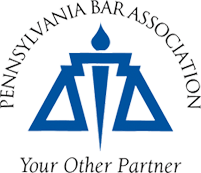HARRISBURG (May 27, 2010) - The governing body of the state's largest bar association is voicing opposition to web-based and in-person legal document preparation services provided by persons not licensed to practice law in Pennsylvania.
The Pennsylvania Bar Association Board of Governors recently adopted an opinion developed by the PBA Unauthorized Practice of Law Committee, which evaluated legal document preparations services offering legal forms and advice online or in person to Pennsylvania residents. The services are offered to Pennsylvania residents contemplating litigation, estate planning, filings with administrative bodies and the creation of business entities. In marketing efforts, the documents are offered typically as "inexpensive" or "cheap" wills, trusts, incorporations (or LLCs) and divorce pleadings.
"Let the buyer beware that web-based legal services and in-person legal document preparation services are not necessarily staffed by licensed Pennsylvania legal professionals," said William F. Hoffmeyer, co-chair, PBA Unauthorized Practice of Law Committee. "Unauthorized practitioners are breaking the law and their services should be prohibited."
Hoffmeyer said that any person claiming to be entitled to practice law in Pennsylvania but is not licensed in Pennsylvania could be subject to charges of a misdemeanor of the third degree upon the first violation. A second or subsequent violation constitutes a misdemeanor of the first degree.
In developing its opinion, the UPL committee reviewed the activities of online and in-person legal document preparation services provided by persons not licensed to practice law in Pennsylvania. To prepare the opinion, the committee utilized descriptions of services posted on websites maintained by legal document preparation services, analysis of newspaper advertisements for such services with physical locations in Pennsylvania and the experience of other state bar associations and courts that evaluated such services, including the Connecticut Bar Association, North Carolina State Bar Association and Ohio Supreme Court.
Founded in 1895, the Pennsylvania Bar Association strives to promote justice, professional excellence and respect for the law; improve public understanding of the legal system; facilitate access to legal services; and serve the 29,000 lawyers who are members of the association.
| 